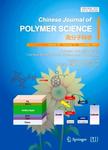EFFECT OF NANO-FILLER DISPERSION ON THE THERMAL,MECHANICAL AND WATER SORPTION PROPERTIES OF GREEN ENVIRONMENTAL POLYMER
EFFECT OF NANO-FILLER DISPERSION ON THE THERMAL,MECHANICAL AND WATER SORPTION PROPERTIES OF GREEN ENVIRONMENTAL POLYMER作者机构:Center of Excellence for Advanced Materials ResearchKing Abdulaziz UniversityJeddah 21589P.O.Box 80203Saudi Arabia Chemistry DepartmentFaculty of ScienceKing Abdulaziz UniversityP.O.Box 80203Jeddah 21589Saudi Arabia Division of Nano Sciences and Department of ChemistryEwha Womans UniversitySeoul 120-750Korea Department of PackagingYonsei UniversityWonju-siKangwondo 220-710Korea Department of Chemical and Biomolecular EngineeringYonsei University262 SeongsannoSeodaemun-guSeoul 120-749Korea Center of Excellence for Advanced Materials ResearchKing Abdulaziz UniversityJeddah 21589P.O.Box 80203Saudi Arabia Chemistry DepartmentFaculty of ScienceKing Abdulaziz UniversityP.O.Box 80203Jeddah 21589Saudi Arabia
出 版 物:《Chinese Journal of Polymer Science》 (高分子科学(英文版))
年 卷 期:2012年第30卷第5期
页 面:735-743页
核心收录:
学科分类:07[理学] 0817[工学-化学工程与技术] 070205[理学-凝聚态物理] 08[工学] 080501[工学-材料物理与化学] 0805[工学-材料科学与工程(可授工学、理学学位)] 0703[理学-化学] 0702[理学-物理学]
基 金:financially supported by the National Research Foundation of Korea Grant funded by the Korean Government(MEST)(NRF-2009-C1AAA001-2009-0092926) the National Research Foundation of Korea(NRF) grant funded by the Korea government(MEST)(No.2011-0016750)
主 题:Poly(propylene carbonate) Cloisite 20B Nanocomposite Solution intercalation Thermal property Mechanicalproperty Water absorption property.
摘 要:Partially exfoliated nanocomposite (2) has been synthesized by intercalation of poly(propylene carbonate) (PPC) into commercial clay, Cloisite 20B (PPC/C-20B). Nanocomposite 2 was characterized phiso-chemically and exhibited high thermal, mechanical and anti-water sorption properties as compared to PPC and intercalated nanocomposite (1) of PPC/C- 20B having same amount of clay. TGA results revealed that the thermal decomposition temperature (Td, 50%) of 2 increased significantly, being 40 K and 17 K higher than that of pure PPC and 1, respectively, while DSC measurements indicated that the nano-filler dispersion of 2 increased the glass transition temperature from 21℃ to 31℃. Accordingly, 2 showed high elastic modulus, hardness and anti-water absorption capacity. These thermal, mechanical alad anti-water absorption improvements are of great importance for the application of PPC as packaging and biomaterials.



